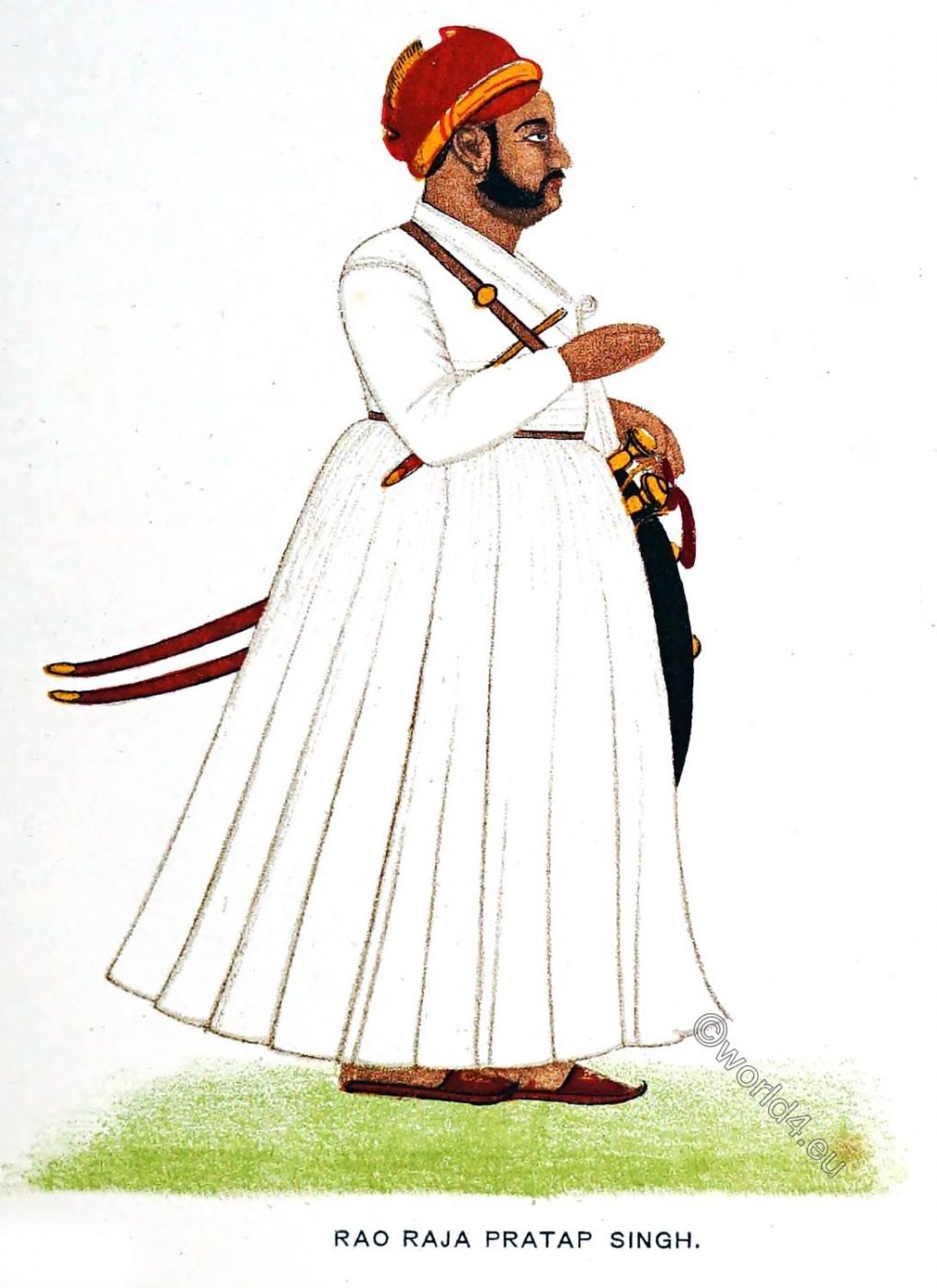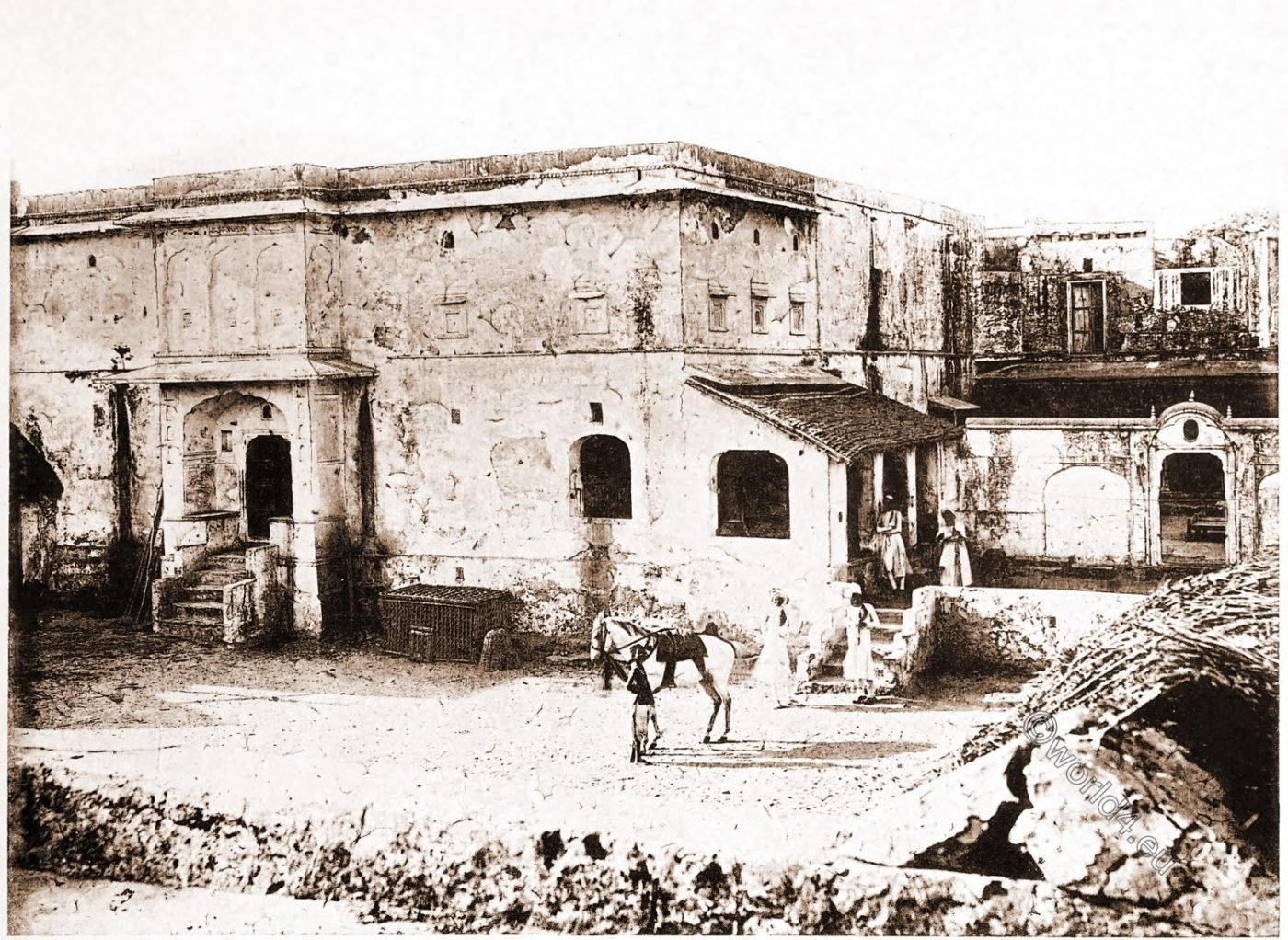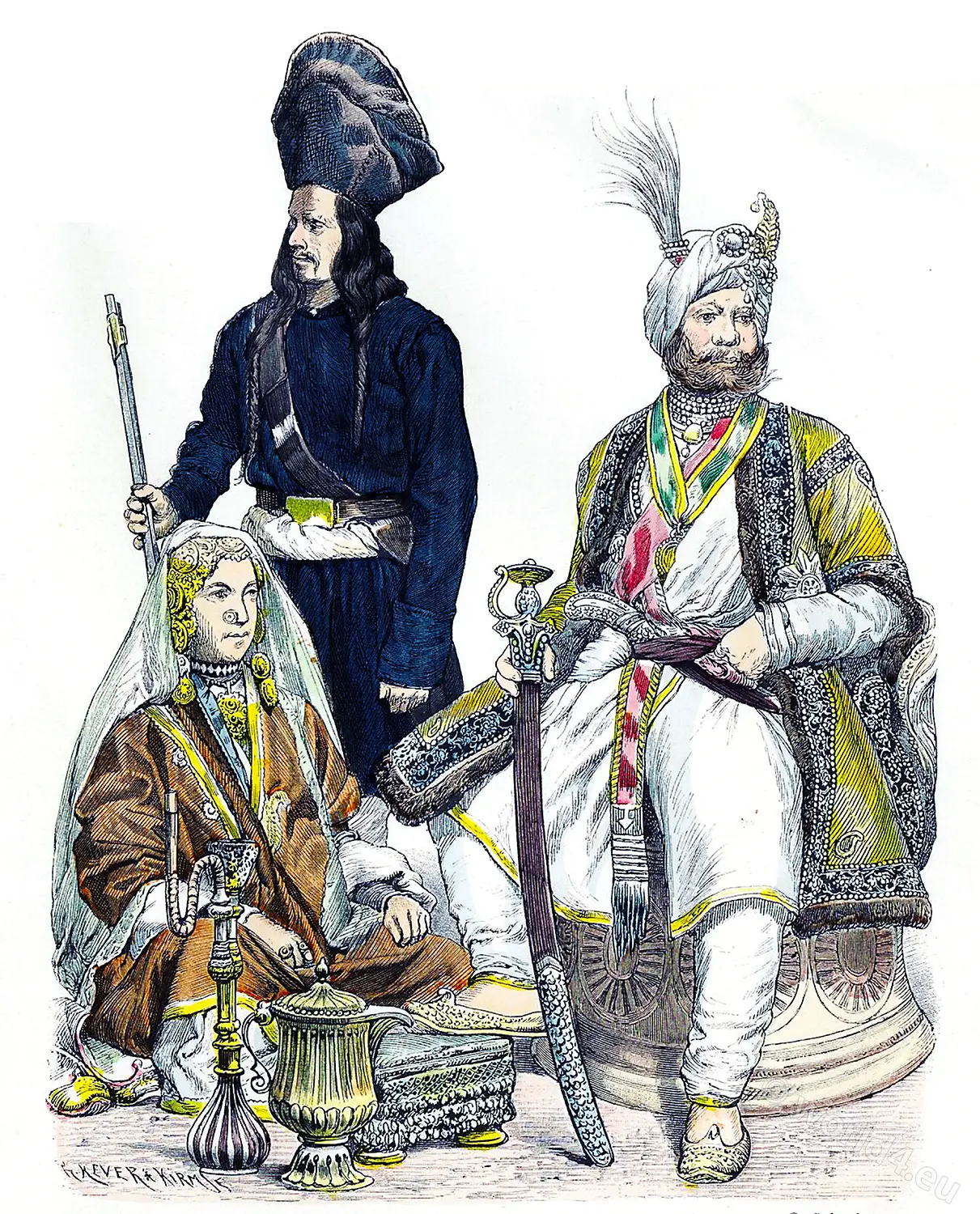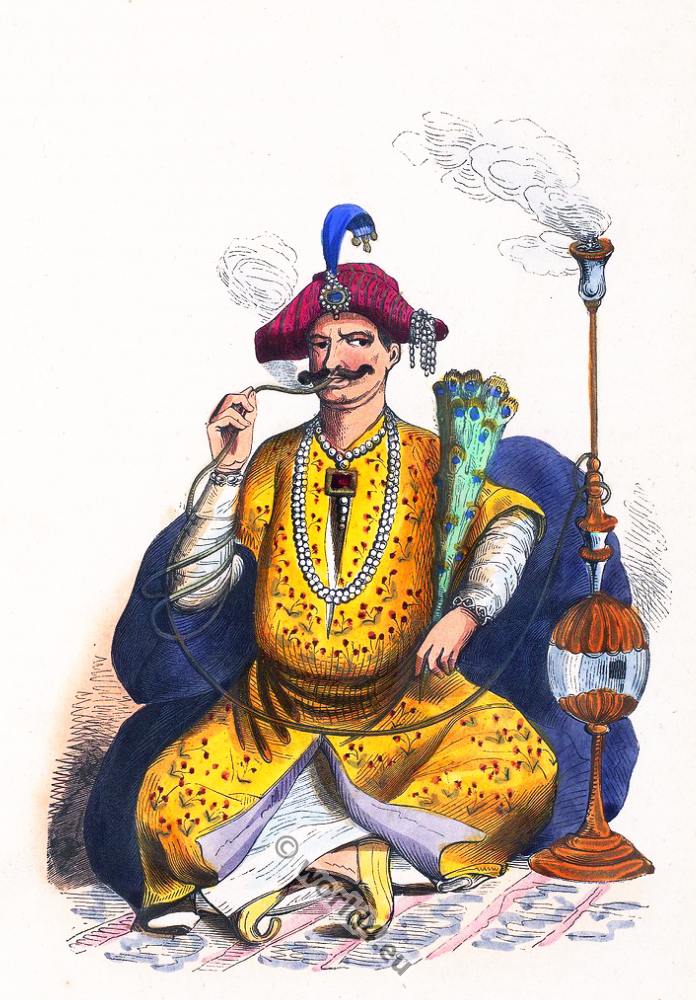
Rao Raja Pratap Singh, Founder of the State of Ulwar (todays Alwar).
Pratap Singh Prabhakar Bahadur (1775–1791) Rao Raja of Alwar, son of Rao Mahabat Singh, was chief of Mácheri, a small town in the south of Alwar (Hindi: अलवर, Alavar), about three miles from Rajgarh, a station on the railway. His life fell in troublous times, when the Moghul house was falling, and adventurers of different faiths and races were striving to carve out for themselves dominions and fortunes on the ruins of the disintegrating empire.
Rao Pratap held a high place in the Jaipur State. He considered himself on a par with the head of the house of Chomu, the premier noble, and his claims were so far admitte at one time, that his sovereign agreed to permit one of the disputants to sit in Durbar while the other remained at home, the usual practice when chiefs claim equal rights.

His personal character, moreover, gave him a still higher position. He was sent to relieve the famous fort of Ranthambhor, which was besieged by the Mahrattas, and he was engaged in other important services; but his ability, and, it is added, the remark of an astrologer, who drew attention to the rings in his eyes, which indicated the future attainment of kingly dignity, led to his being exiled from Jaipur.
He passed through his ancestral estate, and is said while there to have advised his kinsmen to remain loyal to their chief, whilst he himself took service with Suraj Mal, the Ját leader, who then held, besides the modern principality of Bharatpur, much of Alwar and the neighboring districts.
After the death of Maharaja Suraj Mal, who was killed in 1763 A.D. before the walls of Delhi, in the royal preserves, in which he was hunting in bravado, Pratap Singh remained with Jawahir Singh (r. 1763–1768), the new chieftain of the Játs. In 1768 Jawahir Singh insulted the Jaipur chief by marching, without intimation of his intention, through his State, to visit the holy lake of Pushkar near Ajmer, bathing in the waters of which is reputed to pave the way to heaven.

On his return journey he was attacked by the Rajputs of the State he had insulted, and defeated at Maonda-Mandholi in the Tuarawati Hills, 60 miles north of Jaipur. The victory was, in a great measure, due to the transfer by Pratap Singh of his supporters to the side of his liege-lord on the eve of the battle. He was moved to this either by the insult to his country, which a Rajput could in bear, or being tired of “eating the bitter bread of banishment,” by his desire to become reconciled with his own sovereign.
However this may be, Madho Singh, who died four days after the battle, restored to him the fief of Mácheri, and permitted him to build at Rajgarh a fort, which can still be seen from the railway station at the town which grew up around it. This was the first stronghold of importance which Pratap Singh possessed. It is beautifully situated, near the site of a very ancient Baragujar *) town, in the midst of hills, and contains a small palace, in which the principal chambers are adorned with curious old wall paintings. It overlooks a picturesque lake. The town itself is embowered in fine old trees haunted by swarms of monkeys. When these animals have wearied out the friendly consideration Hindus always have for their tribe, they are deported to distant places, but after a while they return to renew their persecution of the long-suffering inhabitants.
*) Baragujar or Birgoojur are one of the ancient Suryavanshi Rajput clans of the Indian subcontinent.
Pratap Singh now resumed his position at the Jaipur Court and became even more influential than before, by the aid of Kushali Ram Bohra, his principal agent and sharer of his exile, who had now become, with the title of Raja, homme des affaires or Prime Minister of the State. His policy worked entirely in the interest of his former patron. His object was to get rid of a rival and favorite of the Queen Regent, known as the Philwan, or elephant driver, from his former profession, and he hoped to effect this by promoting general confusion, of which Pratap Singh fully availed himself.
In the first place, the Raja made himself paramount in his own immediate neighborhood, and built forts at Rajpur, Malikhera, and other places in the south-west of Alwar *). Up to 1768 he appears to have been on good terms with Jaipur, as he was in charge of the heir of the State when he went to Bikanir to be married; but shortly afterwards he began to set up for himself, and even in a year or two seized and held a number of places belonging to Jaipur on the borders of his family estate.
*) In 1770, at Tapla and Rajpur; in 1772, at Malikhera, between Alwar and Rajgurh; in 1773, at Baldeogurh; in 1775 at Pratapgurh, and at about the same time at other places.
These, however, he had to give up some years later. After the battle of Panipat, on January 6th, 1761, in which Ahmad Shah Abdalee broke up the Mahratta power, Suraj Mal Jat (February 1707 – 25 December 1763), who had abandoned his allies the Mahrattas before the conflict, seized Agra, which had been held by them for some time, and also many strong places in Mewat. Amongst these was Alwar. The famous Imperial General, Mirza Najaf Khan (1723– April 26, 1782), determined to lessen the power of the Játs, whom he reduced to great straits. He took the fort of Agra about 1774, and left his antagonists so impoverished that they could not pay the garrison which held Alwar for them, but told them they might make the ruin over to anyone they liked.
Pratap Singh willingly met their demands of payment of their arrears of salary, and at once took possession of the town and citadel. In Jaipur, however, it is stated that the garrison complained to the chief of that State, who deputed Sheo Singh Rajavala of Chithvaree to pay them and take possession. Pratap Singh visited him when he was at a village six miles from Alwar, and suggested that he himself should act as negotiator. His offer was accepted, but the Raja retained the fort for himself, instead of giving it up.
The day of Pratap Singh’s entry into Alwar in November, 1775, is looked upon as the beginning of his independence. He had assisted Najaf Khan in recovering Agra, and, shortly afterwards (about March, 1775), in defeating the Játs at Barsana near Dig. On this occasion the Játs were also aided by Walter Reinhard, a Franco German scoundrel, better known as Samroo. Pratap Singh was rewarded with the title of Rao Raja and a grant by the Emperor, Shah Alum, of his estate of Macheri to be held direct from the Crown. As Najaf Khan himself was held to be in possession of the Alwar district as part of his jagir or fief, the acquisition of its chief town by one of his supporters was not easily tolerated; but whatever disputes (and these disputes even led to the siege of Lachhmangarh, which was raised as the Mahrattas aided Pratap Singh) there may have been in his lifetime, his death in April, 1782, without issue, removed all further difficulties on the subject.
The relations of Pratap Singh, who were settled on lands near Mácheri, began to own him as their chief as soon as the Alwar Fort was taken, and did homage and presented nazrs or offerings, such as an inferior does to his feudal lord. The principal amongst them, however, one Sarup Singh of Rámgarh and Taur or Lachhmangarh, when brought as a prisoner to Alwar, in consequence of a clan quarrel, refused to own allegiance, and orders were issued to put him to death by binding a strip of wetted buffalo’s hide round his head. When dry, the hide contracted and burst open the wretched man’s skull. His lands were absorbed into the new State, and still others were added from the possessions of the Játs, who were now in a very depressed condition and could not prevent the change of ownership.
Pratap Singh also increased his wealth by easing a rich man at Thana Ghazi of some of his possessions, and by plundering Baswa, a town belonging to Jaipure. The latter exploit, however, led to reprisals and an attack upon the fort of Rajgarh by his late suzerain in person. The Maharaja failed to take the place and to defeat his former vassal, on account of the alliance he had formed with the Mahrattas. Moreover, as Pratap Singh adroitly availed himself at one time of the aid of General Perron, Scindhia’s commander, and at another of that of Najaf Khan, the Imperialist chief, it was not difficult for him to retain his independence.
Pratap Singh died in A.D. 1791.
Source:
- Imperial gazetteer of India by Great Britain. India Office; Sir William Wilson Hunter, James Sutherland Cotton, Sir Richard Burn, William Stevenson Meyer. Oxford: Clarendon Press, 1907. Volume 24.
- Ulwar and its art treasures by Thomas Holbein Hendley. London: W. Griggs 1888.
Related
Discover more from World4 Costume Culture History
Subscribe to get the latest posts sent to your email.



